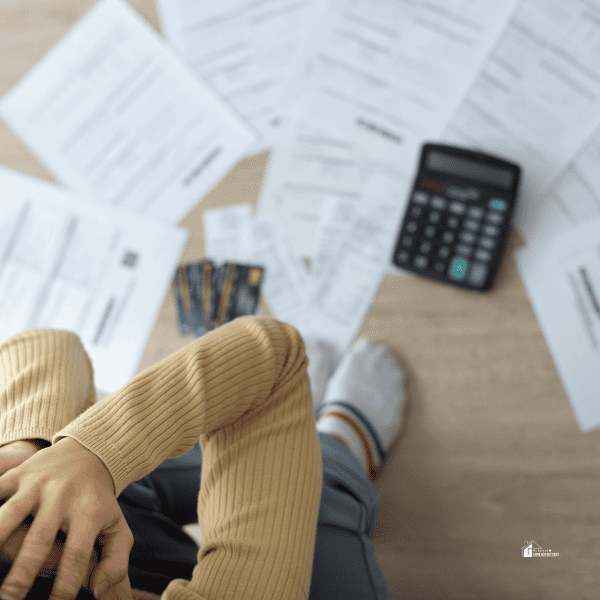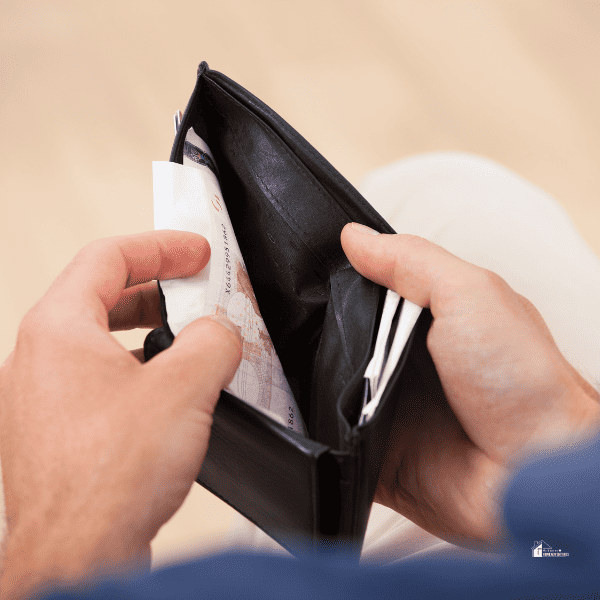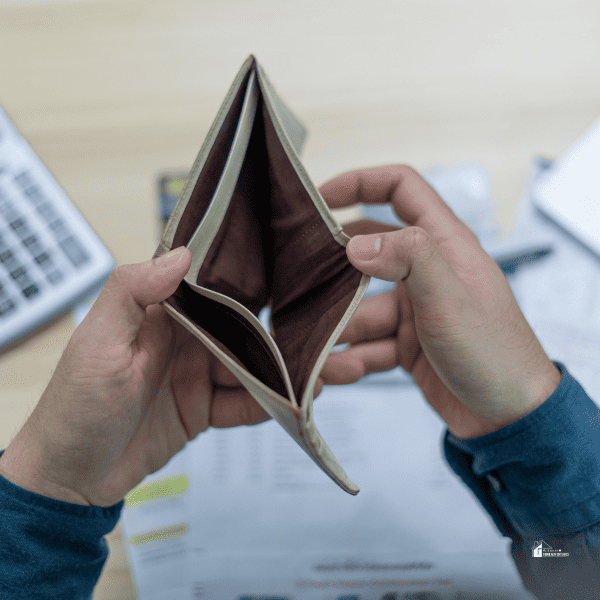Debt-Free But Broke
This post may contain affiliate links which might earn us money. Please read my Disclosure and Privacy policies hereBeing debt-free but broke is a situation that many people find themselves in. On the surface, being debt-free may seem like an ideal state to be in, but when you're also struggling financially, it poses its own set of challenges. Let's explore the definition of being debt-free but broke and discuss the challenges that come with this situation.

Definition of Being Debt-Free but Broke
Being debt-free means that you have managed to pay off all your debts and are no longer owing any money to creditors. It is a significant achievement and can bring a sense of relief and freedom. However, being broke means that you are experiencing financial hardships or struggling to make ends meet. Being debt-free but broke means that despite not having any debt, you still face financial difficulties and may have limited resources to meet your everyday needs and expenses.
The Challenges of Being in This Situation
Being debt-free but broke can present several challenges that can impact your financial well-being and quality of life. Here are some common challenges faced by individuals in this situation:
- Limited Financial Resources: Without any debt weighing you down, you may expect to have more disposable income. However, being broke means that your income is insufficient to cover your basic needs, leaving little room for saving or investing.
- Lack of Emergency Fund: Building an emergency fund is essential for unforeseen expenses or financial emergencies. When you are broke, it can be difficult to save enough to create a safety net, leaving you vulnerable to unexpected financial setbacks.
- Inability to Pursue Opportunities: Financial constraints can limit your ability to take advantage of opportunities such as further education, starting a business, or investing in personal development. Without the necessary funds, you may miss out on these opportunities for personal and professional growth.
- Mental and Emotional Stress: Managing financial difficulties can be mentally and emotionally challenging. The constant worry about meeting basic needs and the feeling of being trapped in a cycle of financial struggle can take a toll on your well-being.
- Limited Choice and Flexibility: Being broke restricts your options and flexibility in making financial decisions. You may not have the freedom to choose where you live, the type of job you take, or the lifestyle you desire.
Being debt-free but broke is a situation that presents its own unique challenges. While being debt-free is a commendable achievement, it is important to address the underlying financial struggles to improve your overall financial well-being. Taking steps towards increasing your income, reducing expenses, and building a solid financial foundation can help you overcome the challenges and work towards a more stable and secure financial future.
Causes of Being Debt-Free but Broke
Lack of financial planning and budgeting
Being debt-free but broke can often be attributed to a lack of effective financial planning and budgeting. While eliminating debt is an important step toward financial stability, it is equally essential to have a solid understanding of your income, expenses, and savings goals. Without a well-defined budget, it becomes easy to overspend or miscalculate your financial capabilities.
Many individuals find themselves in this situation because they did not prioritize financial planning or failed to stick to a budget. Without a clear plan in place, it becomes challenging to track expenses, save for emergencies, and allocate funds toward long-term goals. Sustaining a debt-free status requires careful financial management, which includes monitoring spending habits, controlling impulse purchases, and consistently reviewing and adjusting your budget.
Unexpected expenses and emergencies
Another common cause of being debt-free but broke is the occurrence of unexpected expenses and emergencies. Even with a well-thought-out budget and savings plan, unforeseen circumstances can quickly drain your financial resources. Whether it's a major medical expense, car repair, or home maintenance issue, these unexpected costs can put a strain on your finances, leaving you with limited resources to cover your everyday expenses.
Without adequate savings or an emergency fund, you may be forced to rely on credit cards or loans to meet these sudden financial demands. This can quickly lead to a cycle of debt and financial instability. Building an emergency fund is crucial to protect yourself from these unexpected expenses and ensure that you have a safety net to rely on during challenging times.
In addition to emergencies, it's important to plan for anticipated expenses such as repairs, maintenance, or periodic bills. By incorporating these costs into your budget and savings plan, you can mitigate the impact they have on your overall financial well-being.
Being debt-free but broke often stems from a lack of financial planning and budgeting, as well as unexpected expenses and emergencies. It is crucial to prioritize financial management, develop a realistic budget, and establish an emergency fund to guard against unforeseen financial setbacks. By taking proactive steps to enhance your financial literacy and establish strong financial habits, you can avoid the pitfalls of being debt-free but broke and work towards long-term financial stability and success.

Strategies for Overcoming Being Debt-Free but Broke
Creating a Realistic Budget and Financial Plan
When someone finds themselves in the situation of being debt-free but broke, one of the key strategies for overcoming this challenge is to create a realistic budget and financial plan. Without proper budgeting and financial planning, it becomes difficult to manage expenses, save money, and make progress toward financial stability.
To create an effective budget, start by assessing your income and expenses. Look closely at your monthly income and identify all fixed expenses such as rent/mortgage, utilities, and transportation costs. Then, consider your variable expenses, such as groceries, entertainment, and dining out. It is important to be honest and realistic about your spending habits during this process.
Once you have a clear understanding of your income and expenses, prioritize your financial goals. Allocate a certain amount towards debt repayment, savings, and emergency funds. Be sure to set achievable targets that will allow you to make progress while allowing some flexibility in your budget.
It is also helpful to track your spending regularly. This will help you identify areas where you may be overspending or where you can make adjustments to save more money. Consider using budgeting apps or spreadsheets to track your expenses and visualize your progress easily.
Seeking Additional Sources of Income
In addition to creating a realistic budget, seeking additional sources of income can also be a valuable strategy for overcoming the challenge of being debt-free but broke. Multiple income streams can provide a financial cushion and help you make ends meet.
There are several ways to generate additional income. You could consider taking on a part-time job or freelance work that aligns with your skills and interests. This could include opportunities such as tutoring, freelancing in your area of expertise, or starting a small side business. Alternatively, you could explore the gig economy by signing up for platforms that offer flexible work options.
Another option to supplement your income is to monetize your hobbies or passions. For example, if you enjoy crafting or photography, you could sell your creations or offer your services on online marketplaces. This can be a fulfilling way to earn extra money while doing something you love.
When seeking additional sources of income, it is important to prioritize opportunities that are manageable and do not overwhelm your current schedule. Consider your skills, availability, and personal interests when exploring these options.
In conclusion, being debt-free but broke can be a challenging situation to navigate. However, by creating a realistic budget and financial plan, as well as seeking additional sources of income, it is possible to overcome this challenge and work towards financial stability. Remember to be patient and persistent in your efforts, and seek support from financial advisors or experts if needed. With the right strategies in place, you can regain control of your finances and move towards a more secure future.

Building Financial Resilience and Stability
Setting up an emergency fund
It can be frustrating and overwhelming to find oneself in the situation of being debt-free but broke. However, by implementing certain strategies, it is possible to overcome this challenge and build financial resilience and stability. One crucial step is setting up an emergency fund.
An emergency fund serves as a safety net during unexpected financial setbacks, such as medical emergencies or job loss. It provides a cushion that can help cover essential expenses and prevent the need to accumulate debt. Aim to save at least three to six months' worth of living expenses in your emergency fund. Start by setting aside a portion of your income each month specifically for this purpose. Make it a priority and treat it as a regular bill, ensuring that you contribute to your emergency fund consistently.
Developing long-term savings goals
In addition to establishing an emergency fund, developing long-term savings goals is another essential aspect of building financial stability. Setting specific targets for savings can provide motivation and help you stay on track with your finances.
Consider your future aspirations, such as buying a house, starting a family, or planning for retirement. Break down these goals into smaller, manageable steps. Determine how much you need to save each month to reach these milestones within your desired time frame. Automate your savings by setting up direct deposits into a separate savings account, making it easier to resist the temptation to spend the extra money.
Explore different types of savings accounts, such as high-yield savings accounts or retirement accounts, that offer potential returns on your investment. Consult with a financial advisor to determine the best savings strategies for your individual circumstances.
It is important to remain consistent with your savings contributions, even if you can only afford to save a small amount initially. Over time, your savings will grow, and you will develop the discipline and habit of prioritizing financial stability.
Incorporating mindful spending habits
A crucial aspect of overcoming the challenge of being debt-free but broke is developing mindful spending habits. It is essential to evaluate your spending patterns and make necessary adjustments closely.
Create a realistic budget that aligns with your income, expenses, and financial goals. Identify areas where you can cut back on non-essential expenses, such as dining out or subscription services. Consider engaging in cost-saving activities, such as meal prepping or shopping for second-hand items. Being mindful of your spending can help free up funds that can be allocated towards debt repayment and savings.
Regularly review your budget and track your expenses to ensure you are staying on track. Utilize budgeting apps or spreadsheets to easily monitor your financial progress and identify any areas for improvement.
Building financial resilience and stability requires a combination of strategies. Setting up an emergency fund, developing long-term savings goals, and incorporating mindful spending habits are all crucial steps toward achieving financial stability. By implementing these strategies and staying committed to your financial goals, you can navigate the challenge of being debt-free but broke and work towards a more secure future.
Remember, reaching financial stability takes time and patience, but with determination and the right strategies in place, you can regain control of your finances and enjoy long-term financial well-being.

Seeking Professional Help
Consulting a financial advisor
When facing the challenge of being debt-free but broke, it may be beneficial to seek the guidance of a financial advisor. A financial advisor has the expertise to assess your financial situation and provide tailored advice to help you overcome your current predicament.
The financial advisor will review your income, expenses, debts, and savings to understand the full picture of your financial health. They can then help you create a realistic budget that aligns with your income and expenses while allowing you to allocate funds towards debt repayment and savings goals.
In addition, a financial advisor can provide guidance on investment strategies, retirement planning, and other long-term financial goals. They can help you develop a comprehensive financial plan that takes into account your current circumstances and future aspirations.
By consulting a financial advisor, you can gain valuable insights into managing your finances effectively, making informed decisions, and maximizing your financial stability potential.
In conclusion, seeking professional help when you find yourself debt-free but broke can provide valuable insights and assistance in managing your finances effectively. By consulting a financial advisor, you can develop a strategic plan to regain financial stability.
With the right guidance and commitment, you can overcome your challenges and work towards a more secure financial future.
Being debt-free but broke can be a challenging situation to navigate. However, there are steps you can take to regain financial stability and secure a better future by seeking professional help, such as consulting a financial advisor and developing a strategic plan to overcome your current predicament.
Tips for staying debt-free and financially secure
Once you have overcome your current financial challenges, it is essential to take steps to stay debt-free and financially secure. Here are some tips to consider:
- Create a budget and stick to it: Develop a realistic budget that aligns with your income and expenses. Track your spending and prioritize saving for emergencies and long-term goals.
- Build an emergency fund: Establish an emergency fund to cover unexpected expenses. Aim to save three to six months' worth of living expenses to provide a safety net in case of financial difficulties.
- Avoid unnecessary debt: Be mindful of your spending habits and only take on debt that is necessary and manageable. Avoid unnecessary credit card debt and prioritize paying off any outstanding debts.
- Continuously educate yourself about personal finance: Stay informed about personal finance topics, such as investing, saving, and managing debt. This knowledge will help you make informed decisions and ensure long-term financial stability.
By following these tips and staying proactive in managing your finances, you can maintain your debt-free status and build a secure financial future.
Seeking professional help when you find yourself debt-free but broke can provide valuable insights and assistance in managing your finances effectively. By consulting a financial advisor and exploring debt relief options, you can develop a strategic plan to regain financial stability.
Remember, with the right guidance and commitment, you can overcome your current challenges and work towards a more secure financial future.









